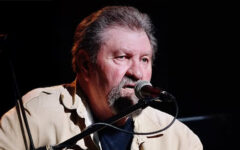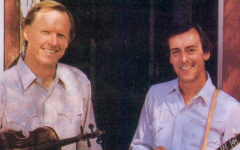
Doolin’ digs deep into the roots of bluegrass by emulating their origins through their interpretation of traditional Irish music. Their’s is an international brew; formed in Toulouse, France in 2005, the six member musicians combine their skills on guitar, bodhrán, violin, tin whistle, and accordion to create a sound that’s both original and authentic. It basks in an old world tradition that was revived and still revered when Irish immigrants first arrived on these shores. In Appalachian environs it eventually morphed into bluegrass, utilizing many of the same instruments, rhythms and homespun sentiments brought herefrom their homeland
Not surprisingly then, the band members arrive at their mix from a disparate array of influences. However taken in tandem, their music is conveyed with an energy and enthusiasm that belies any particular niche. There are elements of grassicana, pop, Celtic music and jazz, the results of which achieve rich results through their interpretive skills.
Suffice it to say, they attracted considerable notice in their native France, and with six albums under their collective belt, their popularity continues to grow.
“The crowds are getting bigger and bigger, so I’d say that French people seem to really like the music we play,” singer and accordion player Wilfried Besse surmises. A recent appearance at MerleFest underscored their potential to attract international appeal, an assertion Besse enthusiastically attests to.
“We’ve just started touring in the USA, and given the atmosphere at MerleFest during our gigs there, I’d say that American people like our music too.” Given their variation in approach, one that veers from tender ballads to upbeat revelry, that common connection stems from their infectious energy.
The band’s latest album, a self-titled set released late last year, marks their boldest attempt yet at forging a wholly accessible sound for American ears. Signed to America’s premier roots label, Compass Records, the band journeyed to Nashville to soak up the sounds normally associated with authentic Americana, and subsequently infuse those influences into their own inherent sound. The album features any number of special guests — Jerry Douglas, Alison Brown, John Doyle, and Kenny Malone among them — adding their input. As a result, it finds an international musical infusion that taps into a wealth of time-honored traditions.
“From my point of view, bluegrass is popular internationally because it’s originally based on a simple series of chords that make it accessible to every ear,” Besse suggests. “The energy is viral, and because it’s mainly played by acoustic instruments, it can offer truth, authenticity and timelessness.”
The new album fuses a basic bond in other ways as well. While several songs reflect their European environs — the riveting and regal The Road to Gleanntan, a sublime take on Jacques Brel’s Amsterdam and an unexpectedly inventive version of Sinead O’Connor’s classic, Famine — they find the ideal cultural crossover with a cover of Steve Earle’s jaunty Galway Girl, as well as a full folk flourish in their remake of Dylan’s Ballad of Hollis Brown.
That then is the secret to Doolin’s delivery — the ability to tap into a traditional template and forge it in a way that assures it universal appeal. And while their music is steadily winning favor with American audiences, they’re also inspiring interest at home when it comes to the wider reach of their particular style and sound.
“I wouldn’t say that bluegrass is a growing movement in France, but I’ve got the feeling it’s always been there,” Besse says. “It seems to be spurred on by the fact that folk music, and more generally acoustic music, are coming back there.”
Ernest and engaging, Doolin’ can consider themselves two way ambassadors when it comes to the cross pollination of American and European motifs. Needless to say, Doolin’ is doing well at sowing those seeds.







